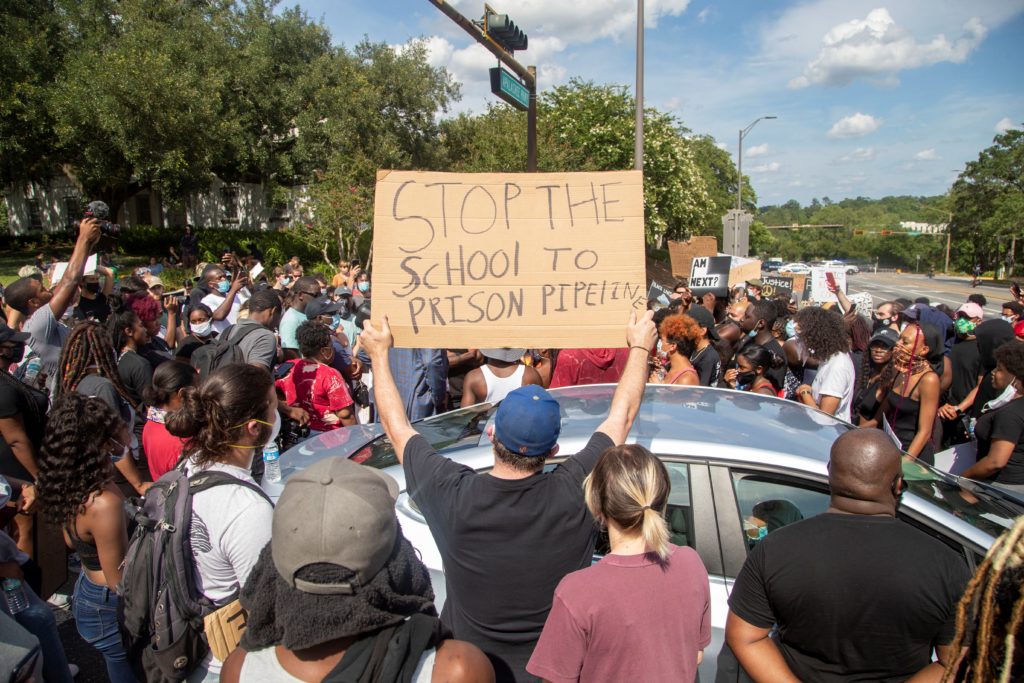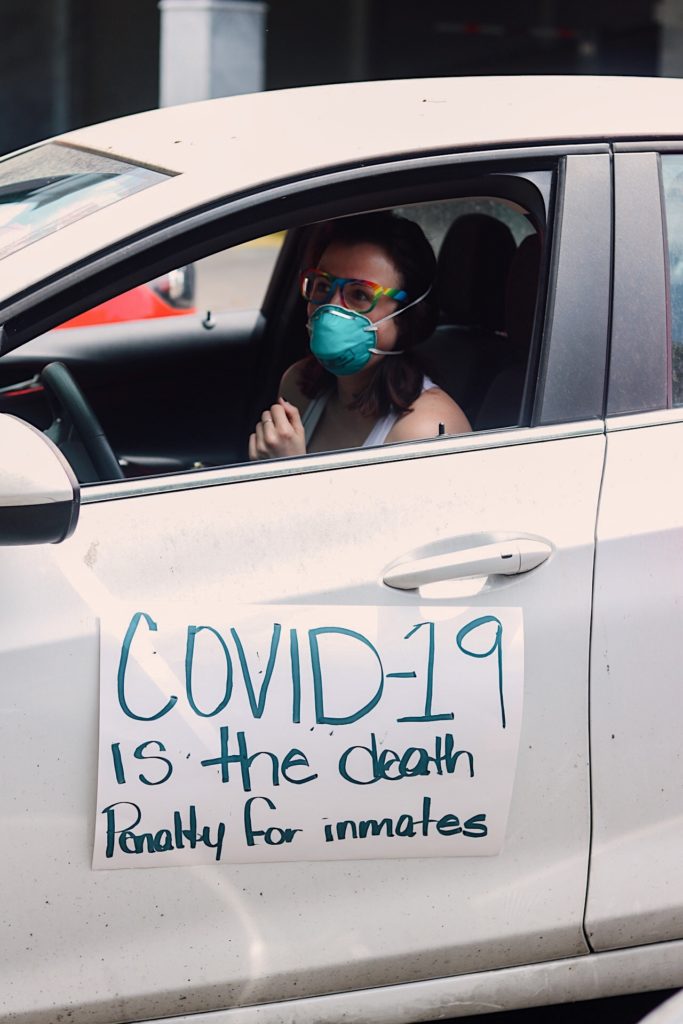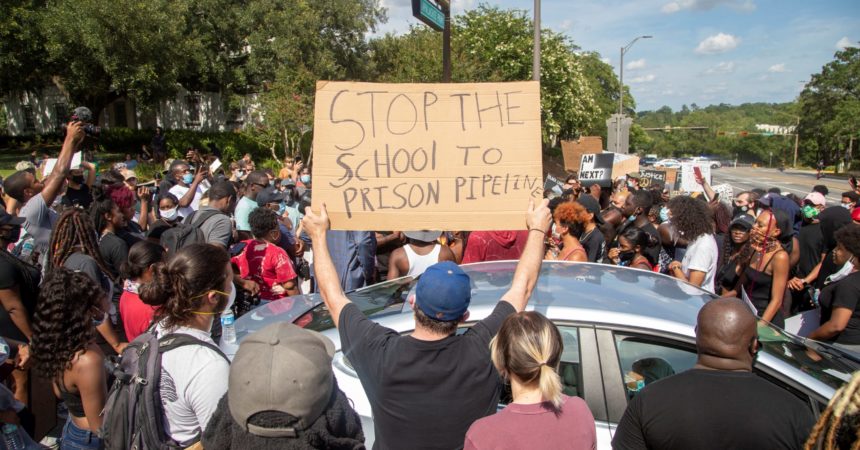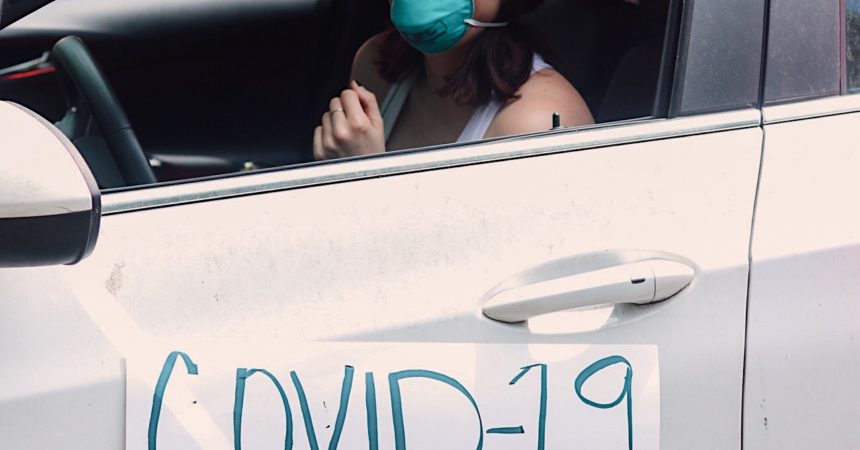Safety is a priority for local protesters
By St. Clair Murraine
Outlook staff writer
Early on during nationwide protests that followed the police killing of George Floyd, health experts worried that some of the scenes were ripe for spreading the coronavirus.
The verdict is still out on that assumption, but it’s also obvious that protesters have something else to be concerned about.
Protecting themselves.
There are counter-protesters or even law enforcement that could mean harm. While federal agents are battling protesters in Oregon, those who have taken up the civil rights causes in Tallahassee don’t think they’ll see the same fate.
They are prepared nonetheless, some of the local leaders said. Since protesting began following the Memorial Day murder of Floyd by a former Minneapolis police officer, local marchers have not met the kind of opposition seen in some cases around the country.

Photo by Vaugh Wilson/Mega Ace Media
The most they have seen of a dust up with counter protesters was at a recent march that started in Wakulla. Before that, there was the incident of a red pickup truck driving through a march at the intersection of Park Avenue and Monroe Street.
Protesters have had marches at multiple sites around the city in the last month, including the governor’s mansion and Tallahassee Police Department.
While those have been peaceful, protesters who are often mostly college students, know the potential risk they face. Take for example when the Tallahassee Community Action Committee recently staged the first Black Lives Matter protest in Crawfordville.
The organization reported that lead organizer Kendra Smith received death threats when the event was announced. However, it went off with nothing more than taunting of the marchers by counter-protesters.
But a plan to ensure a peaceful protest was already in place, the organization said.
“It’s probably the biggest priority that we have out there; how we are going to schedule and organize our events,” said Delilah Pierre, communication director for TCAC.
“We tell people don’t step behind this certain line and stay,” Pierre added. “That’s because we want to restrict movement because we know it’s dangerous for people to get outside of a certain parameter of where we are organizing the protest because if they get isolated from the crowd we wouldn’t be able to find them.”

Photo by Saskiya Fagan
Being aware of taunting is another way that protesters say they prevent a blow-up. Marchers are often told beforehand how to react.
“If someone is yelling at you the best thing to do is not give that person your time and energy,” Pierre said.
There doesn’t seem to be any letting up even as protesters around the country are seeing more resistance. Just last weekend in Aurora, Colo., a car drove through a crowd of protester against racial injustice.
At least one shot was fired and windows were broken in a confrontation with law enforcement.
Lawrence Revell, chief of Tallahassee Police Department, have said on numerous occasions that he supports peaceful protests.
At the same time, local organizers said they will continue to march, with a focus on being non-violent.
“We are going to do it because we have a right to do it,” said Marie Rattigan, lead organizer for Dream Defenders in Tallahassee. “We have a right to be vocal about issues that we do not agree with.
“It’s not only people protesting because of the shooting and killing of Black and Brown people. It’s people organizing because of other issues. Like we are tired of being tired.”
The Dream Defenders aren’t always the lead organization that stages protest in Tallahassee. TCAC is right up there, often protesting an array of issues, including civil rights and defunding the police.
While the idea of taking money from TPD doesn’t seem to be gaining traction, Rattigan said it’s not just about cutting the budget. Instead, she said, at least $10 million could go to fighting poverty and mental health issues in neighborhoods where people are disenfranchised.
Protesters have also demanded the release of names of TPD officers involved in shootings that took the lives of Black suspects. In particular, they’ve met with Revell who said the officers were being protected by the state’s “Marsy’s Law,” which protects victims’ rights.
Protesters want the names of officers involved in the shooting of Latosha “Tony” McDade and Mychael Johnson to be released. That request, however, has been caught up in a court battle. Leon County circuit judge Charles Dodson ruled last week that the officers can’t be shielded, but Florida Police Benevolent Association has filed an appeal.
Becoming a committed protester requires a high degree of selflessness, said Rattigan. Lately, she said she has been inspired by Congressman John Lewis, who died two weeks ago and is being remembered for his activism during the civil rights movement.
“When I’m getting ready for these meetings and protest, I’m no longer operating in self,” she said. “I’m not thinking about what’s going to happen to Marie. I’m thinking about the generation that’s coming after me; what change do I want to see.”
There are plenty of causes that get protesters out in Tallahassee. In addition to marching with Dream Defenders and TCAC, Trish Brown has been involved in protests for the Poor People Campaign, Florida Immigrant Coalition, Dignity Florida and the Youth Education Development Program, a Congolese organization out of Tampa.
Brown, a candidate for City Commission Seat 2, said having an ally – usually a Caucasian – has become a necessity while protesting.
“Allies are always there to protect you,” Brown said. “Your allies are there to shield you; in the front, the back and the left and right side of you.
“Without them, there is nothing.”
Ultimately, though, each protester can help to keep their safety by being cognizant of their surroundings at all times, Brown said.
“No matter what I’m doing, if I see some kind of distraction or disruption going on; I’m always saying this is peaceful protesting,” she said. “We are better than that, we are above that; let’s stay focused on our mission.”









